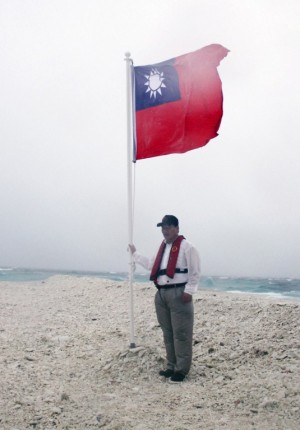In the Know: Itu Aba

A handout picture received from Taiwan’s National Security Council on Sept. 1, 2012, shows Interior Minister Lee Hong-yuan holding a national flag at Itu Aba or Taiping, the biggest islet of the disputed Spratlys on Aug.31, 2012. Solicitor General Francis Jardeleza may have committed a “grave mistake” in his handling of the Philippine case against China in the United Nations arbitral tribunal when he directed the government’s international lawyers to exclude the Taiwan-occupied island of Itu Aba from the 4,000-page memorial before it was submitted to the tribunal in The Hague in March. AFP PHOTO/Taiwan’s National Security Council
Itu Aba, the largest island in the disputed Spratlys, is occupied by Taiwan and administered by its Coast Guard.
The 37.7-hectare island, 463 kilometers away from Palawan province and some 1,600 km southwest of Taiwan, has sophisticated facilities, including a 1,200-meter runway and its own freshwater source.
According to earlier reports, Taiwan is also building a $100-million port next to the airstrip. The port is reportedly designed to accommodate 3,000-ton naval frigates and coast guard cutters. The runway is also being upgraded for Hercules C-130 transport planes.
Taiwan officials said the improvements would be finished by late next year.
China and Taiwan share claims to virtually the entire South China Sea, a legacy of the Chinese civil war when the Communists split from the Nationalists and eventually took control of the Chinese mainland in 1949.
The Nationalists settled in Taiwan and still claim to be the legitimate rulers of greater China.
Vietnam, the Philippines, Malaysia and Brunei also claim parts of the potentially oil-rich South China Sea.
Supreme Court Associate Justice Antonio Carpio, addressing the Philippine Women’s Judges Association in March, discussed the arbitration case filed by the Philippines on China’s claim over the entire South China Sea.
Carpio, who had been going around lecture circles questioning the legality of China’s claim, noted inconsistencies in China’s position that Itu Aba generates its own exclusive economic zone which overlaps with the Philippines’ exclusive economic zone in Palawan.
The arbitration case, a remedy the Philippines sought under the United Nations Convention on the Law of the Sea in January 2013, seeks to nullify China’s claim over 90 percent of the 3.495-million-square-kilometers South China Sea, including waters within the Philippines’ exclusive economic zone called West Philippine Sea; clarify maritime boundaries in the area; and end Chinese incursions into the country’s economic exclusion zone.–Inquirer Research
Sources: Inquirer Archives, sc.judiciary.gov.ph